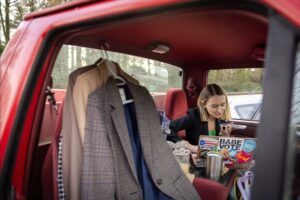A Gen Z Party Chair Hopes to Change Democrats’ Fortunes in NC
MONROE, N.C. — When Anderson Clayton walked into the member meeting of the Union County Democratic Party, her eyes widened and a smile spread across her face as she surveyed the packed room of people who had turned out on a recent weekday evening to meet their new state party chair.
“I really did not expect to come into a room this full,” Clayton said, prompting laughter from the crowd of more than 80 Democrats. “I get my energy from people, and I have got an overwhelming amount of it right now, to be honest.”
One month into her role as head of the North Carolina Democratic Party, the 25-year-old organizer is still getting used to the spotlight as the youngest state Democratic chair in the country. She’s hoping to use her platform to highlight that it is people like her — young and from rural parts of the state — that Democrats need to draw out to help North Carolina flip blue.
Clayton also knows that while being the first Gen Z member in her position has given her more exposure, it also means more pressure to prove, after disappointing results in recent election cycles, that Democrats can fare better in the Tar Heel State in 2024.
She has a tough challenge: Democrats haven’t won a presidential or U.S. Senate race there since 2008, when Barack Obama and Kay Hagan, then a state senator, carried North Carolina. Republicans are one seat short of a supermajority in the state legislature and have control of the Supreme Court. And if Democrats lose the governor’s race next year, the GOP would have an opening topass an abortion ban and sign it into law in one of the last states in the South with abortion access.
“So many people across the state are fed up. I don’t know about y’all, but I’m tired of losing,” Clayton said, drawing cheers and applause from the crowd. “I’m tired of Republicans coming in and threatening my rights. … We all should be so tired and angry.”
Here in Union County, which is about 45 minutes southeast of Charlotte and one of the state’s top poultry producers, Clayton is met with the kinds of Democratic voters to whom she’s hoping to provide a renewed sense of optimism: They live in a red county that hasn’t voted for a Democratic presidential candidate since 1980. And many hail from rural parts of the county that think the party has ignored them.
“We have all experienced a lot of disappointment and discouragement over the past few years and even longer than that,” Lisa Walker, chair of the local party, said as she introduced Clayton. “And with her leadership — it’s just a breath of fresh air. I feel like our batteries are being recharged.”
Clayton was elected chair in February. She said she decided to run for party chair in December after talking with county party chairs and young leaders across the state. She challenged the incumbent chair, 73-year-old Bobbie Richardson, who had been endorsed by Gov. Roy Cooper (D) and the rest of the state’s Democratic establishment. The party’s state executive committee voted 272-223 on a second-round ballot for Clayton over Richardson, a former state lawmaker who became the state party’s first Black chair in 2021. Party leaders, including the governor, were quick to publicly unite around Clayton after her win. Richardson did not respond to a request for comment.
During her campaign for the job, Clayton’s messagewas simple: The state party needs a change in direction. Party leaders and activists have been frustrated over Democratic losses in recent cycles, including in the midterms, when the party lost the state Supreme Court and seats in the General Assembly. In 2022, turnout among Black voters, young voters and those in urban areas fell short of 2018 levels, and rural support continued to erode.
Clayton said she ran for chair to challenge “the idea that demographic changes are going to be what saves the state of North Carolina and what flips us blue in the future. We can’t wait to organize the state that exists 10 years from now. We’ve got to organize the state that we live in right now.”
